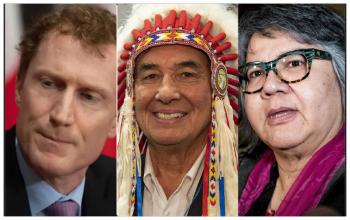Image Caption
Summary
Local Journalism Initiative Reporter
Windspeaker.com
Canada is “open(ing) our human rights record to scrutiny by the international community,” said a representative for the federal government at the United Nations People's Forum on Indigenous Issues (UNPFII) on April 28 in New York.
The statement comes on the heels of Assembly of First Nations (AFN) National Chief RoseAnne Archibald, who called on the United Nations special rapporteur to investigate the findings of unmarked and undisclosed children’s graves on and around the sites of former residential schools.
At a press conference April 26 in New York, Archibald said, “Canada must not be allowed to investigate itself.”
Canada is seeking to establish its own special interlocutor to seek the views of First Nation leaders on the matter of the unmarked graves.
In a letter to the Office of the United Nations High Commissioner for Human Rights in February, Archibald wrote, “Canada’s Special Interlocutor’s mandate specifically precludes any measure of criminal investigation or prosecution associated with the human rights abuses evidenced by these unmarked grave sites.”
Archibald pointed out that recommendations from the UN special rapporteur specific to investigations in Canada “could ultimately inform international standards for comparable abuses, thus being both relevant and applicable for Indigenous Peoples around the world.”
This morning, Daniel Canough, Senior Policy Analyst, International Relations (United Nations), Indigenous and External Relations Branch, Crown-Indigenous Relations and Northern Affairs Canada, called residential schools a “shameful element of our racist and colonial policy in Canada” and said the government would work with Indigenous people in “uncovering the truth.”
“There is a standing invitation to all United Nations human rights special rapporteurs to visit Canada as we open our human rights record to scrutiny by the international community and benefit from lessons learned,” said Canough.
He also said Canada was committed to the protection and implementation of international laws on human rights, which would be done through treaties, self-government agreements and input from Indigenous people in policy making.
In a virtual presentation this morning, International Chief Wilton Littlechild said the UN’s Decade of Indigenous Languages (2022-2032) was an important tool for Canada to right wrongs.
“The most complete and appropriate response to physical and cultural genocide including … brutalities of boarding schools, is to return our languages to their rightful places within the sacred places of our Indigenous homes,” said Littlechild.
Crown-Indigenous Relations Minister Marc Miller addressed the UN plenary on the International Decade of Indigenous Languages. He spoke entirely in Kanien’kéha (Mohawk).
According to a statement from the department, Miller spoke about the efforts being made in Canada to revitalize and promote Indigenous languages, including the Indigenous Languages Act.
“Canada is working closely with Indigenous partners to develop a plan that reflects their vision, as languages are fundamental to identity, culture, spirituality, and self-determination. Indigenous Peoples are best placed to take the leading role in strengthening their languages,” said the statement.
There are more than 70 Indigenous languages spoken across Canada.
Indigenous Services Minister Patty Hajdu was also in attendance at the 21st session of the UNPFII, which runs from April 26 to May 6.
The UNPFII is one of three UN bodies that is mandated to work specifically on Indigenous peoples’ issues.
Local Journalism Initiative Reporters are supported by a financial contribution made by the Government of Canada.

